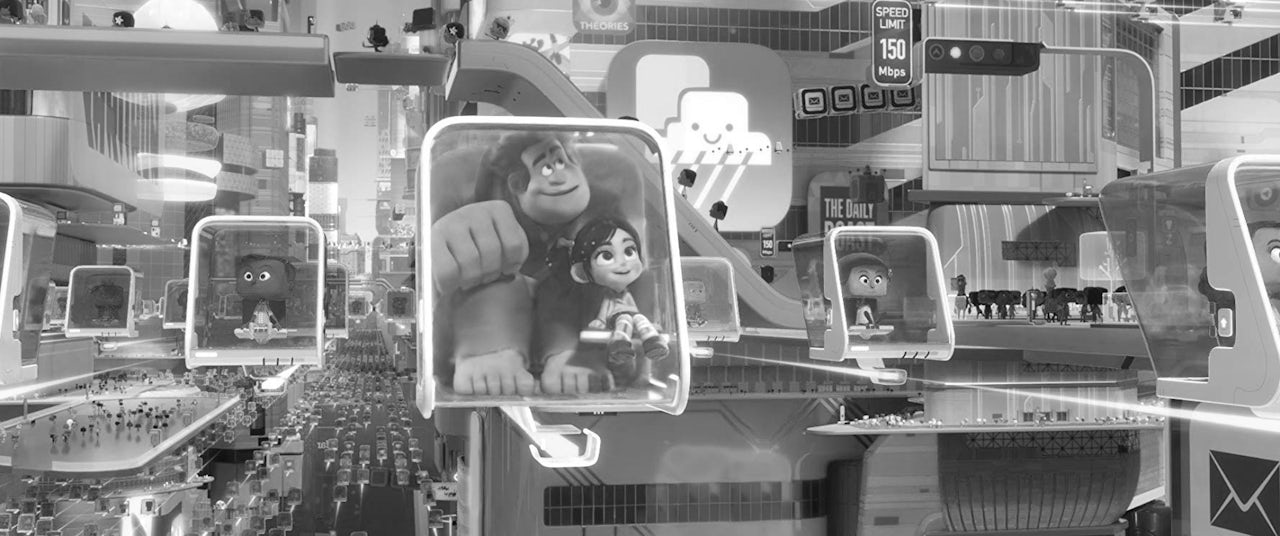Ralph Breaks the Internet, the sequel to Wreck-It Ralph, was released last week to almost universal praise. As with most Disney cartoons, it’s fast-paced with lots of slapstick humor, but what astonished me about the movie was its surprisingly sophisticated theory of the internet. As we experience it, the internet manufactures needs and desires it has no obligation to fulfill, entangling workers in a vicious cycle of servicing a system that doesn’t have human interests at heart. Ralph's worst instincts are exacerbated by his participation in this system, as he gets sucked into the cycle of content creation for “hearts,” i.e. likes that translate into real world money.
Ralph Breaks the Internet takes place in a world where arcade games are staffed by sentient characters, who hang out in the digital ether when they’re not being engaged by real life gamers. The action starts when Sugar Rush, the game staffed by Ralph’s youthful sidekick Vanellope, is accidentally broken by humans. To much drama, the part required to fix it — a sparkly pink steering wheel — costs more than what the game itself brings in a year. (The price? A scant $200 on eBay, which only serves to highlight the growing obsolescence of Ralph, his companions, and arcade games themselves.) The arcade’s owner decides to scrap and sell Sugar Rush for parts, prompting Ralph and Vanellope to traverse the internet through a newly installed Wi-Fi system, and buy that wheel so that Vanellope and her in-game friends can have a home again.
Ralph and Vanellope have no idea what money is, however, as they are literal bits of code floating around in the ether. Treating the eBay auction as if it were a game of shouting the biggest numbers they can think of, they end up with a bill for $27,001. After a botched job where they fail to steal a car worth $40,000 from a GTA-like online racing game (an excellent reminder that people actually do pay money for valued items in games), a street racer named Shank teaches them the golden rule of digital capitalism: If you want to make big money quick, you’ve gotta go viral.
And so Ralph enlists the help of Yesss, the head algorithm at Buzzztube (a portmanteau of, well, the movie isn’t subtle), to make money out of viral videos. The movie shows how a video gets viral, revealed to be a pretty pathetic process. Office workers in a drab office, hunched over their computers in their little cubicles, scroll down the Buzzztube video feed. One particularly depressed man happens upon “Ralph is the G.O.A.T.,” which features Ralph’s head photoshopped on a literal nodding goat. It’s a cute enough premise, but the office worker can’t even muster a laugh. All he can do is weakly press his drooping lips upwards in an attempt to convey amusement, and give the video a heart. That's how the video goes viral, and that’s how Ralph eventually earns enough money: a bunch of sad workers in offices mustering a little contentment for a four-second video out of their long workday.
In the movie, the internet isn’t controlled by actual people. It exists as a sprawling metropolis with plenty of human tourists waiting to be scammed by a pop-up ad or a video featuring a goat. The system is most hospitable to bits of code revelling in the ether, not participants in the digital capitalist economy, which now includes Ralph. The characters might “work” when the humans log on, but it’s the humans who are actually generating value and becoming miserable and unkind in the process. KnowsMore, the search engine behind The Searchbar, comments that people don’t thank him at all for his services; only Vanellope has the manners to do so.
The transactional logic of this system hides the seeds of its own ruination. Ralph, in his chauvinism, can’t understand why all the work he’s put into viral videos and towards the Sugar Rush steering wheel can’t buy him a happy Vanellope who’s just glad to go back to the arcade with him. Instead of talking it out, he travels the dark net for a virus that he doesn’t need to pay for in order to stop her from enjoying Slaughter Race and her burgeoning friendship with Shank, accidentally setting off a large-scale DDoS attack that reduces most of the internet to rubble. At that moment, Ralph’s cruelty looks and sounds like ours. Plenty of people turn to more and more questionable means to sustain a version of life no longer accessible to us — friendship sans metrics and quantifiable interpersonal interest.
When Vanellope finally confronts Ralph for his assortment of misdeeds, she asks Ralph: “Are you stalking me?” Looking people up on Facebook/LinkedIn/Instagram used to be a little creepy, but now it’s just what you do when you care a lot about someone. In the end, Ralph can’t bring himself to enjoy a system of exploitation that he now associates with the internet. He has to leave, while Vanellope can stay. At least she’s having fun, for now.
